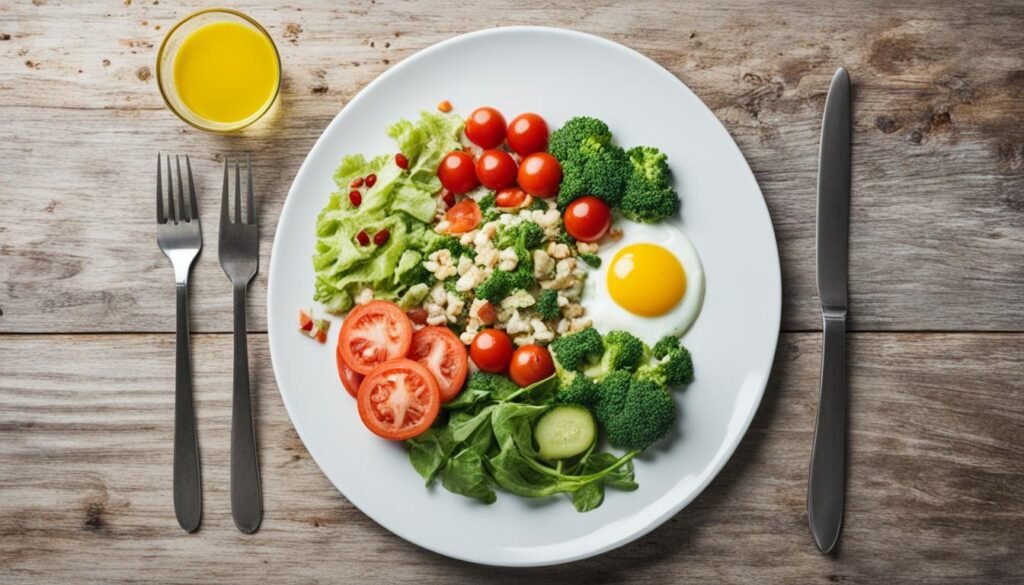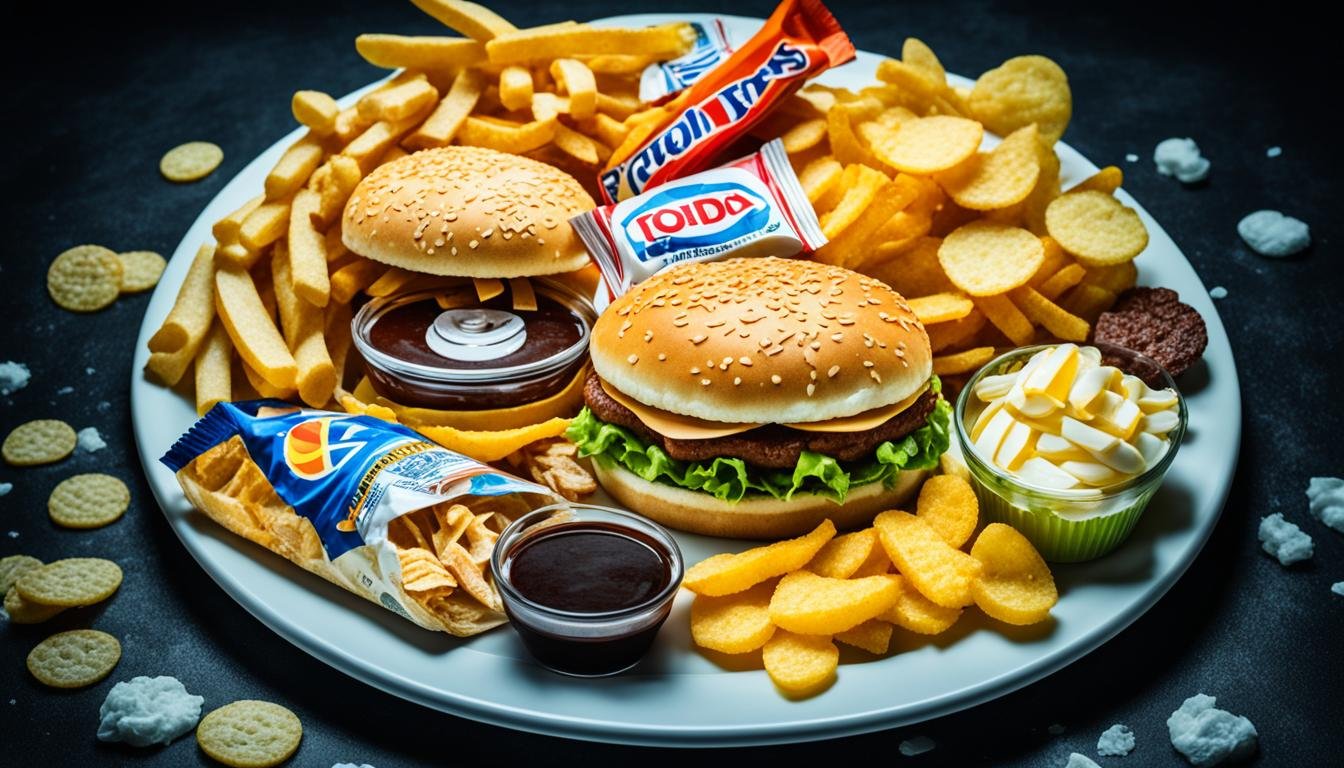Managing depression means looking beyond therapy and meds. Your diet affects your mental health, too. Some foods can make depression worse and harm emotional health. Knowing what to stay away from helps you feel better.
This article looks at how diet and depression are linked. We’ll see how certain foods make depression symptoms worse. Understanding these effects helps you adjust your diet for better mental health.
Key Takeaways
- Avoid processed foods and high-sugar snacks, as they can worsen depressive symptoms.
- Limit your caffeine intake, as it can have a negative impact on your mental health.
- Maintain a balanced diet with plenty of fruits, vegetables, and whole grains to support your emotional well-being.
- Consider incorporating foods rich in omega-3 fatty acids, such as salmon and walnuts, which have been shown to have a positive effect on mental health.
- Remember that small dietary changes can have a significant impact on your overall emotional health.
Understanding the Connection Between Diet and Depression
Depression is often managed through therapy and medication. But, recent studies show that what we eat affects our mood too. Some foods can make depression worse by affecting our brain health. By knowing this, we can choose foods that make us feel better.
The Journal of Psychiatric Research published a study on diet and depression. It found that certain foods may cause more body inflammation. This can change our brain’s chemistry, affecting our emotions.
Researchers have identified some foods that are bad for depression. These include highly processed foods, refined sugars, and bad fats. Such foods can cause more inflammation and stress inside our body. This can mess with the brain’s chemicals that control our mood.
“What we eat affects not only our physical health but also our mental health. Highly processed foods, such as fast food and sugary snacks, can act as triggers for depressive symptoms.” – Dr. Sarah Davis, Psychiatrist
Caffeine, which gives us a quick energy burst, can be harmful too. Too much caffeine might increase feelings of anxiety and make it harder to sleep. Both can make depression worse.
But eating a balanced diet can improve our mood. Foods like fruits, veggies, whole grains, and healthy fats are good for our brain. They may help lessen depressive symptoms.
While diet isn’t a cure for depression, it can make a big difference. Choosing the right foods and avoiding certain ones can help manage symptoms. This is part of taking care of our well-being.
Key takeaway:
- Avoid highly processed foods, refined sugars, and unhealthy fats that can worsen depressive symptoms.
- Limit caffeine intake to minimize the risk of increased anxiety and sleep disturbances.
- Incorporate whole foods such as fruits, vegetables, whole grains, lean proteins, and omega-3 fatty acids to support brain health and improve mental well-being.
| Foods to Avoid | Effects on Depression |
|---|---|
| Processed Foods | High in refined sugars and unhealthy fats, can contribute to inflammation and worsen depressive symptoms. |
| Refined Sugars | Spikes in blood sugar levels followed by crashes can negatively impact mood and energy levels. |
| Unhealthy Fats | Trans fats and saturated fats have been linked to increased inflammation, which can worsen depressive symptoms. |
| Caffeine | High intake can lead to increased anxiety and sleep disturbances, exacerbating depressive symptoms. |
Harmful Foods That Can Aggravate Depression
This section talks about foods that can make depression worse. It’s important to know how these foods affect your mental health. This knowledge can guide you to eat better and feel better.
The Negative Impact of Processed Foods

Processed foods often have a lot of bad fats, sugar, and additives. They don’t offer much nutrition. Eating them can make depression symptoms more severe because they harm the body and brain.
Research shows eating a lot of processed foods might up your risk of depression and other mental health issues.
Try to choose whole, unprocessed foods instead. Things like fruits, veggies, lean meats, and whole grains are great. They give your body important vitamins and antioxidants. This helps your brain work its best and keeps you feeling good.
The Dangers of High-Sugar Snacks
Snacks that are high in sugar, like candies or cookies, might seem like a fast pick-me-up. However, they can cause your mood to go up and down and make depression worse.
There’s evidence that diets full of sugary snacks and drinks are linked to a higher risk of depression, especially in women.
Too much sugar leads to inflammation and stress for your body. This makes it hard for your brain to keep your mood stable. Choosing healthier snacks, such as fresh fruits or nuts, can still give you a snack but in a way that’s better for your mental health.
The Role of Caffeine
Caffeine is in coffee, tea, energy drinks, and some meds. It can make you feel more awake and lift your spirits for a while. But if you have too much, it might mess with your sleep and make anxiety or depression worse.
People with depression seem to react stronger to caffeine. This could make their depression symptoms more intense and bring on feelings of unease or restlessness.
If depression is something you’re dealing with, you might want to lower how much caffeine you get. Choosing decaf options could be a good move. Making sure you get enough sleep and looking for ways to ease stress can also help. These steps might improve your mood and mental health.
Know that processed foods, sugary snacks, and caffeine can make depression harder to bear. Make a choice to steer clear of these foods to protect your mental health. Eating a balanced diet full of whole foods and being mindful about what you eat can significantly help in keeping you emotionally well.
Conclusion
When dealing with depression, what you eat is extremely important. Some foods can make your symptoms worse and harm your mental health. By staying away from these foods and choosing healthier options, you can boost your mood and feel better.
Stay clear of processed foods, sugary snacks, and drinks with lots of caffeine. These “bad” foods can make depression symptoms stronger and shake your emotional balance. Knowing this, you can choose not to eat them and lower the chances of feeling even worse.
Small changes in what you eat can make a big difference in your mental health. Focus on eating balanced meals with plenty of fruits, veggies, whole grains, and lean meats. This helps your body and mind work better. Putting your mental health first, through your diet, is key in fighting depression and living a more joyful life.

Your article helped me a lot, is there any more related content? Thanks!